MCAGTFTC/MCAGCC, Military Family Housing Division is committed to you, our customers, in assisting you with your housing needs. We commit ourselves to the highest level of customer service and strive to exceed your expectations of us. We base our organization on integrity; service and innovation that allows us to better serve the military's finest and their families.
Our Guiding Principles
- Promote and foster community involvement.
- Every resident is important to us regardless of rank.
- Encourage open communication as to allow for change and innovation.
- Our customers are our most important asset.
Our Mission
- Focused on meeting and exceeding expectations for safe and attractive community neighborhoods that families enjoy.
- Always being ready to assist families with questions and concerns in a clear, concise, courteous, and professional manner. Our Families come first.
- Monitoring and mentoring Maintenance Services that are expedient, trusted and valued.
- Improving quality of life for our families by creating a positive family housing experience.
Our Vision
To be a world-class Military Family Housing Office. One that becomes a benchmark for other Military Family Housing Offices; one that impresses its customers the first time and every time; one that embraces and effects change versus impeding it; and one that never loses sight that our military families are our most important asset.
| Housing Coordinator |
760-830-6611 |
| Housing Referral Specialist |
760-830-1706 |
| Housing Coordinator |
760-830-1707 |
Location: Bldg. 1455, 4th Street
Hours: 0800-1600 Monday-Friday |
Estimated Wait List Times - Updated 06/01/2025
E1-E3 HOUSING
2 BR - 0-60 Days
3 BR - 0-60 Days
4 BR - 30-60 Days
E4-E5 HOUSING
2 BR - 30-60 Days
3 BR - 30-60 Days
4 BR - 60+ Days
E6-E9 HOUSING
3 BR - 0-60 Days
4 BR - Immediate Availability
5 BR - 30+ Days
WO1-O3 HOUSING
3 BR - Immediate Availability
4 BR - Immediate Availability
O4-O5 HOUSING
3 BR - Immediate Availability
4 BR - 30+ Days
Disclaimer
The estimated wait time is the amount of time you can expect to wait for housing. Depending on the circumstances, generally unpredictable out of our control, the wait time could be in some cases shorter or longer than published. The estimated wait times are based on the best information available at that time. A wait time provided to you at the time you submit an advance application may change. These uncontrollable circumstances include: number of families on the wait list, reported intent to vacates, construction, ongoing renovations and deployments. All impact the establishments of the estimated wait time. Wait times do not change frequently.
Eligibility
Military personnel who are authorized Basic Allowance for Housing (BAH), assigned to MCAGCC or have been issued Permanent Change of Station (PCS) orders, and have one or more bonafide dependents residing with them for over six consecutive months are eligible to apply for base housing.
Apply In Person
Applications for on-base housing are accepted at the Military Housing Office, Bldg. 1525 5th Street, from 0800-1600 Monday through Friday.
Apply via Email
All documents (linked below) may be submitted to the Military Housing Office (MHO) at any time provided the service member has qualifying dependents and has received PCS orders (including Basic Orders) to MCAGCC.
Contact the Military Housing Office at (760) 830-6611 to obtain your rank specific coordinator's email address.
Once the MHO receives a copy of your orders (Basic or official) and the required documents listed below, your control date for the wait list will be established. When ALL documents have been verified, your application will be *referred to Liberty Military Housing for placement on the appropriate waiting list.
*Additional documents and verifications may be required prior to referral to Liberty Military Housing.
Required Documents for Military Housing Assignment
- Housing Application DD-1746 (assignment to housing): Please complete, sign, and fax or email the documents below to start the process.
- Privacy Act Release / Megan's Law Form: Privacy release for housing to share your information with the Marine Corps Public-Private Venture Partner; includes the Megan's Law addendum to the application for assignment to housing.
- Combat Center Statement of Understanding: Housing applicant statement of understanding.
Who is eligible to apply for Base Housing?
Military personnel who are authorized Basic Allowance for Housing (BAH), assigned to MCAGCC or have been issued Permanent Change of Station (PCS) orders to include web orders, and have one or more bona fide dependent(s) residing with them for over six consecutive months are eligible for base housing.
When can I apply for Base Housing?
An application for base housing may be submitted to The Military Housing Office (MHO) at any time provided the service member has received PCS orders (including web orders) to 29 Palms and has qualifying dependents. A service member with imminent marriage plans may apply for family housing 30 days prior to date of marriage.
What qualifies a dual military couple to occupy housing?
- In order to rate base housing, BOTH service member's (SM) must be permanently stationed at the same installation. To apply, both members must either be stationed here, or have orders directing them here (MCAGCC must be the assigned duty station.
- If only one member in a dual military couple is stationed at MCAGCC they must have a qualifying dependent residing with them for over six consecutive months in order to be eligible for base housing.
For more information, see CCO 11012.1S
Will living in housing affect BOTH service member's BAH?
The "with dependent" BAH rate is required as rent to occupy quarters. If dual members currently have no other dependents and are receiving the "without dependent" BAH rate, PPV will collect the difference on a monthly basis. Service members will be required to pay the difference as stated in the lease agreement.
What determines my position on the waitlist?
Waitlist position is determined by an individual's Control date.
What determines my control date?
Control dates are established in one of the following ways:
- If an advance application, DD Form 1746, and all supporting documentation including PCS orders are received by the housing office, the date of receipt is the control date.
- If no advance application is received, the date of detachment from the previous command is the control date providing the application is submitted within 90 days of the reporting date.
- If no application is received within this time frame, the date of receipt of the application by the housing office will be the control date.
- In cases where residents are requesting to move from their current quarters to another set of quarters, the date of their request, if approved, becomes their control date.
- Designated key and essential personnel (Per CCBul 11101) may be assigned to a house, if one is available upon arrival or placed in a position of priority on their appropriate waiting list.
Why Does my Position on the Waitlist Keep Changing?
Because positions are determined by control date, there may be incoming applicants with a control date prior to another individual. In these instances, applicants with an earlier control date would appear before you on the waitlist in the respective order of control dates. Examples of why this would occur include:
- A member applying with PCS orders has an earlier Control date than your own.
- A member applies for housing, and has one or more Priority Exceptional Family Member Program (EFMP) family members.
- A member is deemed to be Key and Essential by the Base Commanding General and is place in a priority status.
Do EFMP families rate priority assignment?
Priority assignment is determined on a case by case basis based on the EFMP enrollment letter issued to the member from Headquarters Marine Corps as part of the program requirements. The enrollment letter must state “Priority Housing is recommended.”
Can I wait for a particular area, neighborhood, or type of house?
No, unfortunately because of our high occupancy rates eligible personnel will be assigned to the next available set of quarters once they reach the top position on their respective waiting list. They will not be allowed to choose an assignment to a particular set of quarters or housing area.
Can I accept a smaller unit than I am qualified for if the waitlist is shorter?
Yes. However, requests to relocate to a larger home at a later date will not normally be granted.
Are the neighborhoods separated by rank?
Yes. Housing areas are categorized by rank regardless of DoD Component.
E1-E3 Junior Enlisted
E4-E5 NCO
E6-E9 SNCO
01-03/WO-W3 Company Grade
04-05/W4-W5 Field Grade
06 Senior Officer
07 + GOQ
Can I relocate to a Different Home once I am already in Housing?
Transfers on Station (TOS) requests are approved or disapproved by the Family Housing Office/Liberty Military Housing on a case-by-case basis. A minimum of six months in quarters is normally required before such requests are considered. An inspection of the unit is required in order to proceed with request to relocate.
What do I do after I check into 29 Palms and my new unit?
Marines need to report to IPAC and conduct a New Join Audit. Once your audit is completed ask IPAC for a BAH Recertification Letter, also known as a Housing Letter.
Sailors need to report to PSD where they will receive a Statement of Service Letter.
After the service member physically checks into the MHO with all appropriate unit/IPAC endorsements his/her application is referred to our Public-Private Venture (PPV) Housing Partner Liberty Military Housing. Original establish control date will be utilized for placement on appropriate PPV housing waiting list.
Once a service member reaches the Freeze Zone (top 10% or top three applicants, whichever is greater) his/her position on their appropriate wait list will be stabilized.
When a service member reaches the top of their assigned list they will be offered the next available set of quarters. In most cases service member will be given no less than a 31 day notice of housing assignment.
What happens to my Household Goods (HHGs) if housing is not available when I arrive?
DMO will store your HHGs until housing becomes available at which point you would schedule you delivery to your assigned house. If you are living in the local community while waiting for base housing and choose to have your HHGs delivered to that location you in most cases would rate a “Courtesy Move” by DMO to your assigned house on-base.
If I am on the wait list but not in housing yet can I still enroll my child/children in school?
Yes, upon arrival to 29 Palms you will receive a DD-1747 (Status of Housing Availability) from the MHO. This form will allow you to enroll your child/children into their appropriate school without the need of having a base housing address.
Public Private Venture
What is Public Private Venture (PPV)?
Congress authorized the Public Private Venture (PPV) initiative in 1996 with the intent of improving Family Housing faster and at a lower initial cost to the government. While the government retains land ownership, the PPV partner provides resources to improve Family Housing and operates, maintains and assigns the homes.
Why has the base entered into public private ventures?
The shrinking housing budget coupled with aging housing units and maintenance backlog make it difficult for the Navy/Marine Corps to provide quality housing to service members. The public private partnership will make it possible for the Navy/Marine Corps to renovate and construct family housing quickly and economically.
Who oversees the partner?
Oversight of the partner will occur on several levels including Headquarters Marine Corps, Naval Facilities, Southwest Division, and daily interaction with MCAGCC staff.
What recourse do military families occupying PPV have if the property manager does not respond to service needs?
Personnel at the Central Family Housing Office will continue to be available to occupants of PPV housing. Annual resident surveys will be conducted with results submitted to the Base. In addition, each PPV housing site will have resident representatives to speak for all residents at Resident Advisory Boards. Resident issues brought to the board will be brought to the base military leadership for appropriate action.
Who enforces the rules under PPV?
Both PPV Partners and Government Staff will enforce all rules and regulations.
Who do I call for housing maintenance under PPV?
Contact the 24HR Hotline: (888) 578-4141.
If maintenance isn't satisfactory, whom do we address the issue with?
Contact Government Family Housing, located in the Military Housing Office, Bldg. 1003, at (760) 830-6611 between 0800 - 1630 Monday through Friday.
Resident Energy Conservation Program
How is my energy usage target determined?
Your house will be grouped with other housing units into like-type energy baselines so that utility usage targets are set based on comparable home energy performance. The Monthly Utility Usage Target is calculated every month based on the current month’s average for like-type housing units. A 10% plus and minus buffer is set around the utility usage target in order to establish the normal usage zone.
What if there is an extremely hot summer/cold winter?
Your utility usage target is established on a monthly basis to account for actual weather changes.
Can I get information about the like-type group I’m in?
Yes, your Resident Services Manager/Housing Office can provide you with that information.
How will this program affect my Basic Allowance for Housing (BAH)?
There will be no impact to the BAH allowance.
How does billing work?
Residents who use less than the lower utility usage buffer will accrue a credit or rebate and residents who use more than the upper utility usage buffer will have a balance due. Monthly, you will receive an actual invoice. Depending on your consumption for the month, this invoice will show that you have a credit, have to pay the balance due, or have no charge, and will indicate when you need to submit payment of the balance.
How and when will I expect a rebate?
Residents whose monthly utilities cost is 10% or more below the monthly usage target will earn a credit or rebate that will be payable when the accumulated rebate exceeds $25. Residents can elect to roll-over savings credits to apply against charges they may accrue in future months.
We have two children in our family and live in a 3-BR home. Many of our neighbors do not have children. Will the monthly usage average for our like-type group be skewed?
Like-type homes are homes with comparable expected energy usage based on a number of criteria including neighborhood location, size (number of bedrooms and square footage), and year of construction. These factors and the number of homes in each group (often between 50 and 100) serve to normalize the variations in family size within the 10% range.
Pet ownership provides real and tangible benefit that significantly contributes to the quality of life for service members and their families. However, all residents assigned military family housing are responsible to the health, safety, and tranquility of the community and must adhere to both Marine Corps policy and pet agreements established within their lease.
Policy Information for Incoming Residents
Per MCO 11000.22
- Base housing residents may own up to two pets; dogs and/or cats.
- Pit Bulls (American Pit Bull Terrier, American Staffordshire Terrier, Staffordshire Bull Terrier), Rottweiler’s, any Wolf hybrid or any mix of the aforementioned breeds are not permitted in family housing or aboard the base.
- Barnyard or exotic pets (reptiles, ducks, rabbits, chickens, ferrets, pigs, etc.) will not be allowed in family housing.
- Rabies vaccination are required for pets and it is strongly suggested to include parvo, distemper, and any other vaccinations recommended by a veterinarian.
- It is strongly recommend that you microchip your pets.
- Any damages caused to the unit or grounds by my pet(s) are the resident's responsibility.
Prohibited Breeds
 American Pit Bull
American Pit Bull American Staffordshire Terrier
American Staffordshire Terrier Staffordshire Bull Terrier
Staffordshire Bull Terrier Rottweiler
Rottweiler Wolf Hybrids
Wolf Hybrids
Information for Current Residents
If you encounter any issues with stray animals, excessive dog barking, or any other animal nuisance that needs to be addressed contact your housing district manager at the number below.
- Adobe Flats District: (760) 910-9655
- Ocotillo District: (760) 368-4021
- Palm District: (760) 368-4500
- Vista Del Sol District: (760) 361-6158
Dog stations are located across the base for your convenience. Please clean up after your pets.
There are several dog parks throughout the Liberty Military Housing communities: Sandhill and Maumee (Adobe Flats), Smoketree and Mineral (Joshua Heights) and corner of Upshur and Cannon (Ocotillo). There is also a dog park at the Vista Del Sol Community Center, adjacent to the swimming pool.
A dog run, located at Bourke & 5th streets (behind Heritage Park on Bourke) has cordoned off areas where dogs may be unleashed.
Veterinary care is available at the Army-run clinic behind the Commissary in Bldg 102. Services include examinations and vaccinations for your pets. All pets in base housing must be micro-chipped, which can be done at Veterinary Services. For more information call (760) 830-6896.
Pet Health and Safety
Pet Safety: Emergency Preparedness (pdf)
About Canine Parvovirus (pdf)
What to do if you encounter wildlife on the Base
If the wildlife is non-threatening, do not disturb it.
If you encounter any type of threatening wildlife during business hours contact Environmental Affairs at (760) 830-5728 / 5719 / 5720. After business hours contact the Desk Sgt at (760) 830-6310.
Coyote

- Never feed coyotes. Feeding endangers everyone as it lures coyotes into neighborhoods.
- Keep unattended pets indoors or in an enclosed run, especially at night. Don't assume a fence will keep a coyote out of your yard.
- Don't run away or turn your back on a coyote.
- Do not allow a coyote to get between you and your child or pet.
- If you have a close encounter with a coyote, yell, clap your hands, blow a whistle, and try to make yourself appear larger.
Download the Coyote Awareness flyer to learn more about cohabitating safely with coyotes.
Desert Tortoise
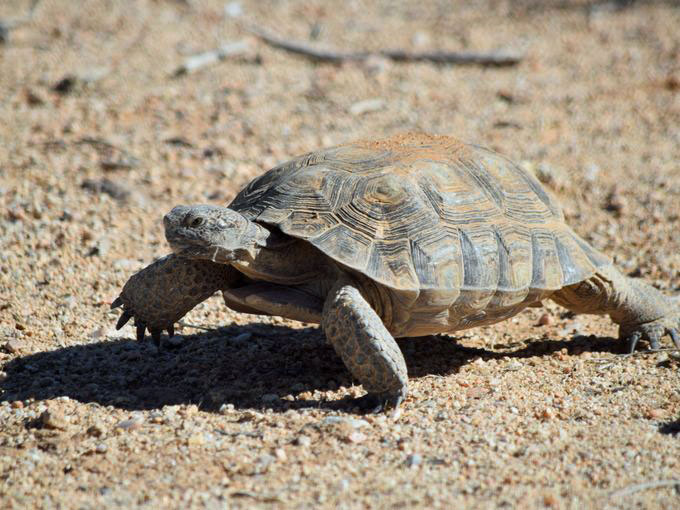
- It is against the law to touch, harm, harass or collect a wild desert tortoise.
- Stay at least 10 feet away from any tortoise and keep dogs leashed at all times.
- Desert tortoises have been known to seek shelter under parked vehicles. If you park in the desert, look under your vehicle before you drive it.
- Don't dump or litter; desert tortoises can get tangled in trash and it also attracts predators that feed on the tortoises, their eggs, and hatchlings.
- If you see a tortoise in danger, slowly approach from the front, pick it up and take the animal about 100 feet and leave it in the shade. Do not carry the tortoise more than 18 inches above the ground and do not tilt or turn it over for any reason.
Giant Hairy Scorpion

- Giant desert hairy scorpions look much more dangerous to humans than they actually are.
- The scorpion is generally docile and will run from confrontation, but it will assume a defensive position and sting if it is cornered or provoked.
- Stings should be treated like a bee sting. Wash thoroughly with soap and water to clean the wound and apply a cold pack to reduce swelling and pain.
- Scorpions may enter homes under doors, through damaged window screening, and any cracks in the foundation while looking for water and shelter.
- If indoors, the scorpions may seek shelter during the day in shoes and folded clothes and blankets. Make sure to shake out any gear left outside overnight.
Tarantula

- Tarantulas are nocturnal and come out during the cooler and darker hours.
- Despite its reputation, this spider is docile, reclusive, and nearly harmless.
- The tarantula is not poisonous to humans, but its bite can be painful if provoked.
- The venom is usually no worse than a bee sting.
- If you are bit, wash the site with soap and water to minimize the chance of infection, apply a cool compress to induce numbness and reduce swelling, and stay alert for symptoms of an infection or allergic reaction.
Rattlesnake
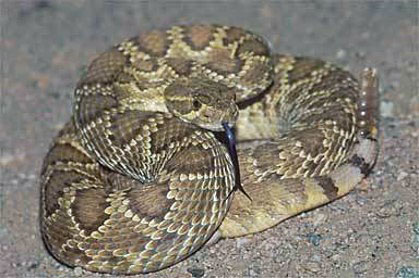
- Rattlesnakes may roam at any time of the day or night; if walking at night be sure to use a flashlight.
- When walking through wild areas, wear over the ankle hiking boots, thick socks and loose fitting pants. Never go barefoot or wear sandals in the wild.
- When hiking, stick to well-used trails if possible. Avoid tall grass, weeds, and heavy underbrush where snakes may hide during the day.
- Rattlesnakes will not attack, but if disturbed or cornered, they will defend themselves. Reasonable watchfulness should be sufficient to avoid snakebite.
- About 25 percent of bites are "dry," meaning no venom was injected, but the bites still require medical attention.
- If bitten by a rattlesnake the California Poison Control advises:
- Stay calm.
- Wash the bite area gently with soap and water.
- Remove watches, rings, etc. which may constrict swelling.
- Immobilize the affected area.
- Transport safely to the nearest medical facility.
If you need help with pest control, contact your district manager at the number below.
Adobe Flats District 760-910-9655
Ocotillo District 760-368-4021
Palm District 760-368-4500
Vista Del Sol District 760-361-6158
Cockroaches
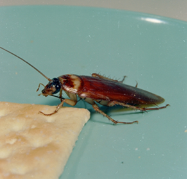
- American cockroaches prefer to live in warm, dark, wet areas and they often enter structures through drains and pipes. Clean out drains by rinsing with hot water.
- Thoroughly clean all potential food sources especially food preparation areas.
- Clean up spills as soon as possible.
- Store food in pest-proof containers.
- Empty trash cans daily or avoid putting food items in trash.
- Confine eating to a dining area.
Fire ants
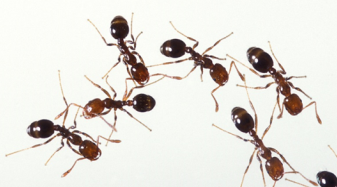
- Fire (red) ants build large mound nests that are flattened, irregular in shape, and between two and four square feet in size.
- Fire ants and their telltale mound nests should be actively avoided. Fire ants will sting humans who disturb a nest.
- The sting of a red imported fire ant is painful and often results in a raised welt.
- If you are stung, keep the wound clean and intact to prevent infections.
- Persons allergic to insect stings will react more severely to red ant stings.
- Excessive swelling, itching or redness at the site of the sting, or other symptoms like shortness of breath, thickening of the tongue, or profuse sweating are all symptoms of a serious allergic reaction. Seek professional medical attention immediately.
Rodents
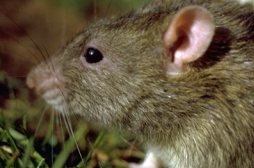
- Rodent behavior is typically driven by hunger, thirst, curiosity, or maternal instinct. They enter structures to look for food, water or shelter.
- The most effective way to control rodents around homes or facilities is to remove food attractants like exposed garbage, food items left on business desks, excess dog or cat food, bird feeders and fallen fruits and nuts from trees.
- Residents should also ensure their homes have physical barriers in place to keep rodents out. The most common entryways are wide gaps under doors, unscreened ceiling vent holes and torn window screens. All rodents, no matter what size need just a 1/4-inch hole or gap to enter.
- Keeping landscaping clear of clutter, excess vegetation and tall grass will keep rodents from nesting close to homes or facilities where they could gain easy access to the structure.
Spiders
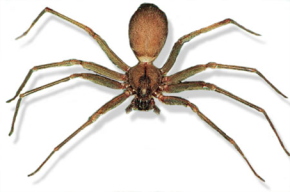
- Be cautious when entering areas that are infrequently visited and disturbed such as storage sheds, wood piles, attics, utility sheds, etc.
- Routinely clean out storage areas.
- In indoor storage areas, place boxes off the floor and away from walls to reduce harborages. Seal boxes with tape.
- Vacuum carpets and furniture routinely.
- Avoid attracting flying insects to buildings with exterior lighting. Reducing flying insects near buildings will deny spiders of their food.
Renters' Insurance 101
What is renters' insurance?
A renter's insurance policy is insurance for those renting housing of any type which protects your personal property against damage or loss and protects you from liability for damage to the rental property associated with your actions, or for someone that is injured while on the rental property you are occupying.
Do you need renters' insurance?
You are strongly encouraged to purchase renters' insurance to protect against personal loss or liability due to unforeseen circumstances *Renters' Insurance is NOT part of the rent you pay to the PPV Partner.
Download our Tenant Guide to Renters' Insurance to learn about the different types of coverage, cost of coverage, and what to consider when purchasing a policy.
Renters' Insurance Cost Comparisons
DON Renters' Insurance in Privatized Military Housing Memorandum
What is a Public Private Venture?
Public/Private Venture (PPV) is a partnership between the Marine Corps and a private company. Marine Corps Air Ground Combat Center (MCAGCC) has one property manager; Liberty Military Housing. The private company (typically a limited liability company) builds, renovates, maintains, and manages family housing communities.
Key PPV Features
- Minimal to zero out-of-pocket
- Military construction quality or better
- Elimination of renovation/replacement backlog
- Guaranteed operations and maintenance resources for the long term
- Future renovations/replacements fully funded by the project
- USMC reserve accounts established to fund future unknowns (utility spikes, etc.)
- USMC participation in all key management decisions
Typical Community Services
- Large multi-function community centers
- Community recreation and education programs (coordinated with MCCS)
- Routine service calls response in 1-3 days
- Change of occupancy maintenance in 7 days
- Property managers maintain front landscaping
- High speed internet ready
- Pools, basketball courts, playgrounds, trails, etc.
Quality site and home designs
- Well-landscaped, pedestrian-friendly sites
- Excellent home architecture and layouts
- Functional floor plans
- Significant storage space
More information about PPV can be found on our Frequently Asked Questions page.
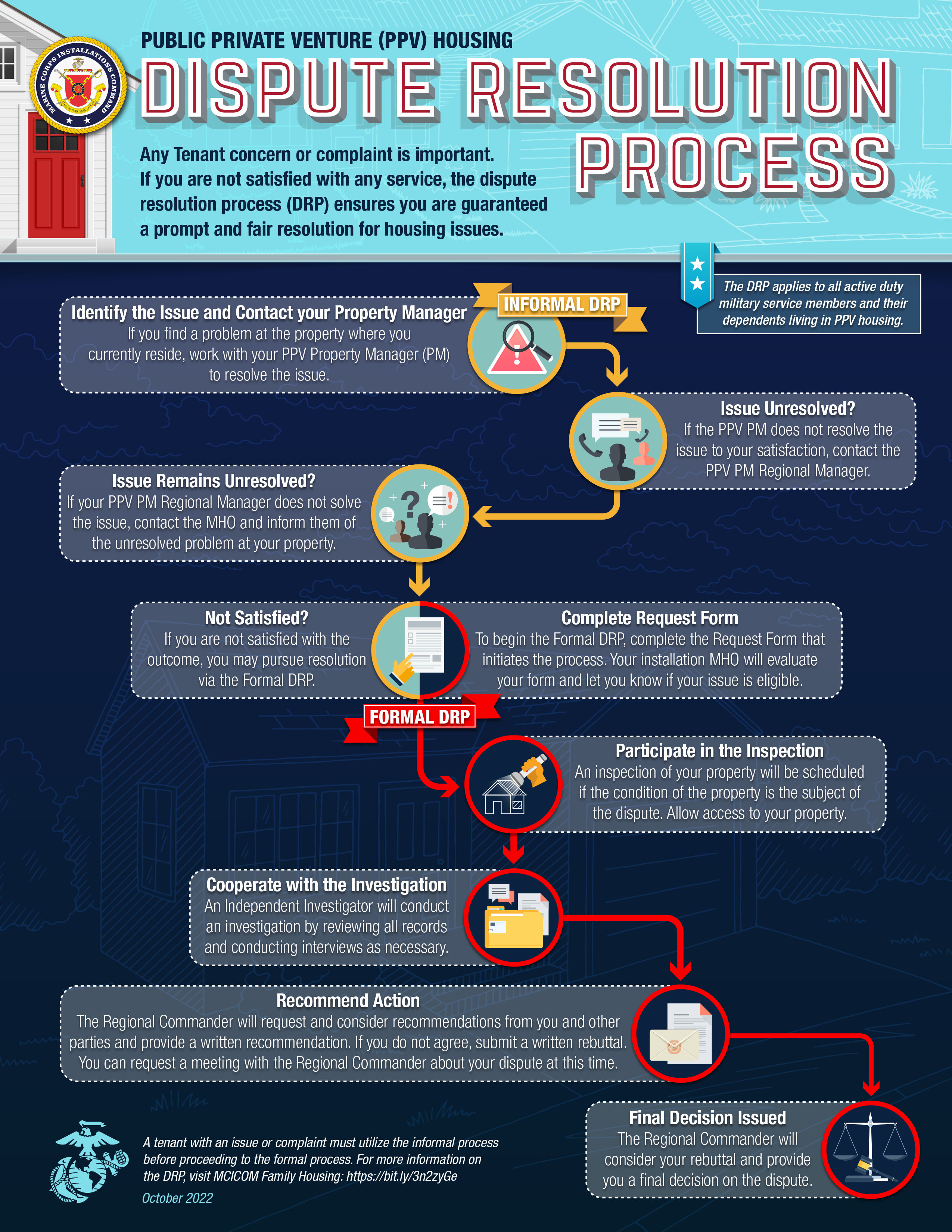
Do you have a needed repair, a suggestion or a concern?
Liberty Military Housing is committed to enriching the lives of military families through providing quality homes and vibrant communities. Your feedback is an important piece in helping us accomplish this goal, and we want to ensure we provide you with an avenue to initially address your needed repair, suggestion or concern and the process to escalate it, should that be necessary.
Our flyer provides an outline of the easy Three-Step process for concerns and opportunities to provide feedback.
Dispute Resolution Process Flyer (pdf)
MCICOM Policy Letter 2-22 (pdf)
Like all Navy and Marine Corps Bases, the Marine Corps Air Ground Combat Center participates in the Residential Energy Conservation Program (RECP).
RECP is the result of a Department of Defense (DOD) initiative that has been implemented in all Public-Private Venture (PPV) family housing units aboard all Marine Corps installations. RECP supports the Marine Corps’ energy strategy by encouraging energy conservation and reducing electricity costs.
RECP helps align base housing utility use with usage in private communities. The more energy-efficient residents are, the more money is saved and reinvested to improve base housing communities. Research shows that residents use over 20 percent less in utilities when they are directly responsible for utility Usage vs. Payments.
It is up to residents to determine what is acceptable energy usage based on their personal lifestyle choices.
Residents within plus or minus 10 percent of the average usage for their type home will have no cost impact. Residents using less energy than the plus or minus 10 percent average will be rewarded with cash or credit towards future bills. Residents using more energy than the plus or minus 10 percent average are billed for that usage in excess of the normal usage buffer zone.
Savings generated by RECP are reinvested into housing communities to improve homes, playgrounds, community centers, and quality of life for service-members and their families.
Housing officials continue to review housing areas, and are also conducting energy audits of those homes with higher than average usage to assist in helping residents lower their bills.
Approximately 90 percent of utility complaints are resolved by simply educating residents on the program. When residents are out of the normal range for energy usage, housing officials engage with education, energy audits and equipment calibration if needed. When equipment is found to be operating inefficiently, the resulting bill is often waived once repairs are affected, to include refunds if appropriate.
Headquarters Marine Corps RECP Guidance allows Wounded Warriors and Registered Exceptional Family Members (EFM) members living in privatized housing who consume significant amounts of electricity as a direct result of their unique medical circumstances to request a waiver. Waiver requests must be submitted through the EFMP office or the Wounded Warrior Bn.
Wounded Warriors and EFMP Waiver Process (pdf)
Wounded Warriors and EFMP Waiver Request (docx)
Part of the Marine Corps Energy Ethos is education. We partner with Liberty Military Housing to ensure base residents have access to information about responsible energy use and to know how to request assistance. We strongly feel that energy conservation has both direct and indirect impacts on mission-readiness.
Conserving Energy at MCAGCC
The Department of the Navy Resident Energy Conservation Program (RECP) seeks to achieve energy efficiency in military family housing, where utility usage has historically been higher than for those living in off-Base communities. The more energy-conscious residents become, the lower utility costs become, making more funds available to improve homes and communities. Data shows utility usage is reduced by 20% or more when families assume responsibility for consumption.
How does the program work?
Like-Type Groups (LTG) are created by grouping homes with similar characteristics that affect home energy performance. These criteria include square footage, number of bedrooms, location, and age of the structures. Each month, the average electricity usage for each LTG is developed; this average is known as the “baseline.” 10% buffers are added above and below the baseline to create a “normal usage band.” Resident’s whose usage exceeds the normal usage band incur a charge for use above the band; residents whose use falls below the normal usage band receive a rebate.
Where can I find my LTG information?
LTG information is provided on the monthly utility statement. The utility billing company can provide this information, as can the district housing office.
How does the program incentivize good energy habits?
Residents who use less than the normal usage band will accrue a credit or refund, and residents who use more than the upper normal usage band incur a charge for excess consumption.
What are the average payments and refunds?
About 38% of the families get a refund on their monthly utility bill, about 28% are in the average usage band, and about 33% pay an overage. Average payments in all areas except Hawaii average $35 while refunds average $25.
How can I reduce my energy usage in base housing?
- Turn lights, appliances, electronics, and other electricity consuming items off when not in use.
- Regulate your thermostat to minimum heating and cooling requirements.
- Do not use appliances which are against the base order (like window air conditioning units).
Items that can use significant energy
- Air Conditioners
- Deep Freezers
- Space Heaters
- High-End Electronics
- Heat Lamps
- Aquariums
Find out more in our RECP FAQ or contact the Base Housing office at (760) 830-6611.